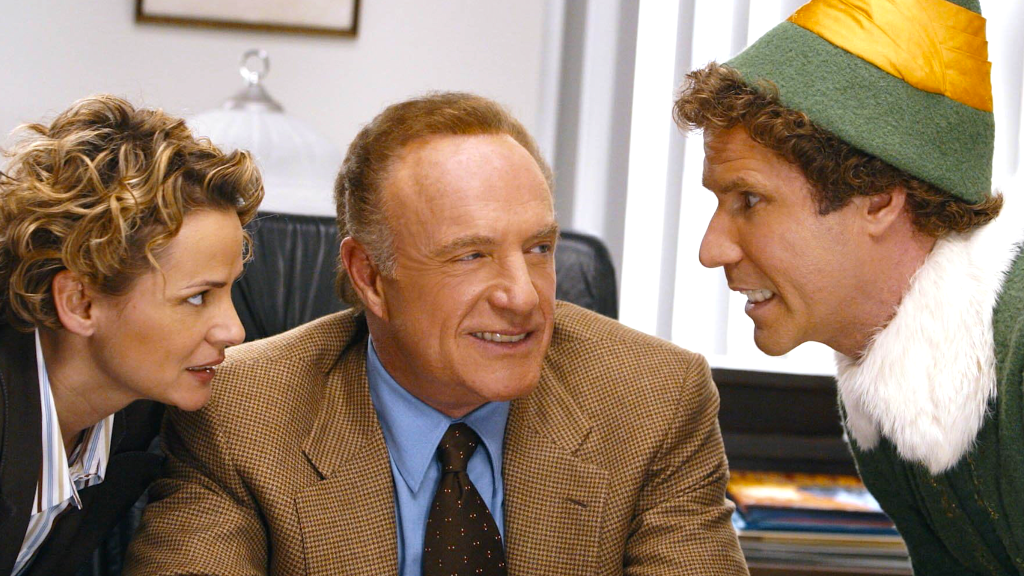The Broadway screen-to-stage adaptation of Elf transforms Will Ferrell’s holiday classic, replacing key scenes and characters while reimagining its central father-son relationship. A comprehensive overhaul of the beloved 2003 film, Elf: The Musical — currently running at New York City’s Marquis Theatre through January 4, 2025 —introduces numerous changes that reshape the familiar story for the stage. The alterations range from narrative framework to character motivations, creating a distinct theatrical experience.
Videos by ComicBook.com
The most immediate change comes in the story’s presentation, with Santa Claus replacing Bob Newhart’s beloved Papa Elf as narrator. Technology updates modernize Santa’s operations; he now consults an iPhone instead of his traditional list of names while delivering gifts. The setting itself sees changes, with Macy’s replacing Gimbels for the department store scenes.
Character changes abound throughout the adaptation. The North Pole sees a shift in its elf population, with Ming Ming being replaced by Charlie, and a new character named Shwanda joining the ensemble. Looking toward the future, Buddy and Jovie’s child changes from a daughter to a son. These alterations extend to how characters enter the story, with Buddy now being dropped off at the Hobbs house rather than being bailed out of jail by Walter.

The musical substantially reimagines Walter Hobbs’ character arc. Unlike James Caan’s deliberately neglectful workaholic, the stage version presents Walter as simply overwhelmed and forgetful. “James Caan performs him very well in the film, but this is a stage musical, so there has to be a bit more scope to the character,” Walter’s stage actor Michael Hayden told Us Weekly. This softer approach extends to Walter’s place on Santa’s naughty list — rather than greed and meanness earning his spot, it’s merely his lack of belief in Santa.
Several iconic sequences from the film have been eliminated. Audiences won’t see Buddy’s adventures in the Empire State Building mail room or his heroic snowball fight defending Michael from bullies in Central Park. The antagonistic Miles Finch character has been cut entirely, with the pivotal father-son conflict now arising from Buddy accidentally shredding the only copy of an unpublished manuscript by deceased famous author Chris Smith.
New plot elements have been added to fill these gaps. A fresh subplot focuses on Michael and Emily Hobbs’ disbelief in Santa Claus. The story’s climax takes a significantly different path when Buddy suggests turning his North Pole origin story into a book, leading to the musical number “The Story of Buddy the Elf.”
[Related: The Real Reason There’s Never Been an Elf Movie Sequel]
The musical’s finale takes a different approach as well. After Buddy pitches his own origin story as a potential book, Mr. Greenway unexpectedly loves the idea. However, Walter still quits after Mr. Greenway insults his sons — a marked departure from the film, where Walter chooses to skip the pitch entirely to search for Buddy, resulting in his firing. This restructuring changes the emotional weight of Walter’s choice, making it more about standing up for his family than choosing between work and family.

Grey Henson, stepping into Ferrell’s curled-toe shoes, acknowledges the influence while making Buddy his own. “[Will’s] performance is so deeply injected into my veins because I know the movie so well, as we all do, so I don’t even have to think of the performance to let it inspire what I do with it,” he shared with Us Weekly. “But what’s so special about doing adaptations of shows is that it’s inevitable that you’re going to do it differently because I’m a different person … You can’t escape being authentic.”
The L.A. Times notes that book writers Thomas Meehan and Bob Martin have added more adult-oriented humor, though questions whether such additions serve the story’s family-friendly spirit. Their review observes that “the movie’s grown-up fans delight in the same gentle comedy that entertains the youngsters.”
Waitress composer Sara Bareilles defends such adaptational changes. “It’s really important to remember that the mediums are very different for a reason,” she told Us Weekly. “One of the things we discovered in adapting Waitress was that things that we had to not be precious. You have to give some breathing room from exactly what happened in the movie in order to make it work on stage.”
Even iconic moments find new theatrical life through creative reimagining. While the famous Central Park sleigh scene can’t be replicated exactly on stage, Kalen Allen, who plays the Macy’s store manager, notes the production’s version creates its own magic: “I watch the kids react and even the adults and see so much wonder in their faces. There’s nothing like it.”
The production concludes with an energetic finale featuring tap-dancing Santa’s helpers, illustrating how theatrical staging can create its own kind of magic distinct from film. While some purists might question the changes, the musical’s creative team has crafted an adaptation that honors the original’s spirit while embracing the unique possibilities of live theater.








